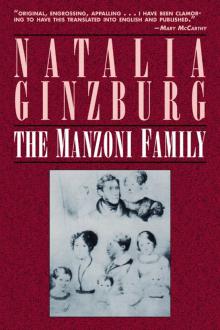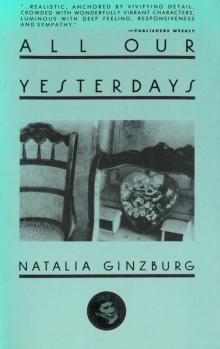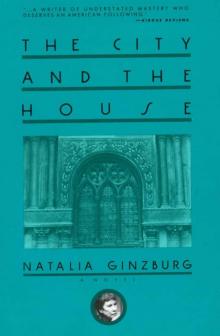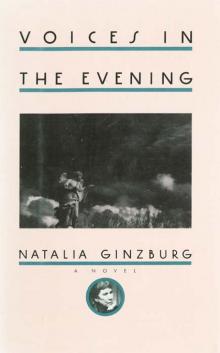- Home
- Natalia Ginzburg
The Manzoni Family Page 10
The Manzoni Family Read online
Page 10
In January 1826 news came from Genoa that Abbé Degola had died. His nephew, Prospero Ignazio, wrote to Manzoni. ‘Poor Don Eustachio had had bronchitic attacks two or three times over the last few years, and they became more frequent and led to vomiting. In order not to feed his illness he lived on a very strict diet, abstaining from any stimulants, and this caution enabled him to get through the summer and autumn reasonably well, but without succeeding in eradicating the germ of his illness, the symptoms of which reappeared at the beginning of December last. After two weeks of unavailing treatment, he was stricken by acute pains in the head, so persistent that they tormented him to the end. . . The patient went into a steady decline, and, losing his joviality, appeared indifferent to the company even of his best friends; finally he showed unmistakable signs of a failure of his mental faculties, often asking for the same thing, and talking quite at random. But it was not until Friday the 13th of this month that we began to fear for his life, as he lay in a deep lethargy. Then on Saturday he roused himself and was fully conscious to receive the last rites. Nothing could disturb his tranquillity. And therefore, setting aside all worldly thoughts, he turned only to thoughts of Heaven. . . What resignation between the spasms! What virtue! Four hours before his death he asked for some of his family, and summoning all his remaining strength to his cold lips, he took a tender farewell of us, and turning to me said love me, I promised it, whereupon he added but if you love me, do what I have always told you: words spoken with such effort and love that I shall never recall them without tears. . .’
In March 1826 Enrichetta had a baby boy who was called Filippo. She could not feed him herself, so a nurse was taken.
‘My dear friend,’ Fauriel wrote to Manzoni, ‘It was double pleasure to receive your news from the amiable messenger who brought it, and who has so courteously passed on the news he has continued to receive from you.’ The ‘amiable messenger’ was Giacomo Beccaria, Manzoni’s cousin. ‘I was most of all eager to have news of our very dear Enrichetta; so you can judge my delight to hear that she had safely given birth to a fine handsome little Filippo, who will, I hope, soon take over Enrico’s place on my shoulders. . . I am still in rather low spirits, if less so than the last time I wrote: and perhaps this is why my health is not so good as when I left Brusuglio and the Pyrenees. Paris is not one whit more pleasing to me than when I first arrived, and I can’t imagine I can stay cooped up here all summer. . . If I were free to consider only my own wishes, feelings and desires, I would fly back to you and find, the well-being and calm that surrounded me, and I cannot bring myself to give up all hope of such a sweet prospect. But the fact is I have committed myself to some serious work with fixed dates for completion, which obliges me to use my time judiciously, and to remain in or near Paris. . . When I consider how much remains to be done to complete this task, it is quite frightening, so to avoid being frightened I try not to think too much about it, and to waste as little time as possible.’ This letter was delivered by hand, with others for Giulietta and Ermes Visconti, by the Marchese Trotti and his wife, friends of the Manzonis, who often travelled between Paris and Italy. Giulietta replied: ‘Papa says how sorry he is not to be able to write to you, but there is a storm brewing up and he feels so poorly that he really feels unequal to it (as you know, he always feels ill in stormy weather). He wanted to write something in reply to the letter you sent me by the Marchese Trotti; he was so touched that he keeps talking of it. . . . He also wanted to say how sad he is that you will not be at Brusii, which robs him of much of the pleasure he feels in going there. Papa longs to see fruit of your completed labours, which will be doubly pleasing because this liberation may lead to your coming here, so it is a sort of passport which he most eagerly desires. This is what he has told me over and over again to say to you, with such urgency and so little faith in my ability that he has made me more clumsy than usual. . . Filippino is doing very well with the new nurse; he is growing fast and laughs when you talk to him; if he is as cheerful as his nurse, he will be very cheerful indeed. . . I often talk about you to Cavalier Jacopetti who comes twice a week in the evening, and to Princess Pietrasante, and Jacopetti talks about you to please me, and he is not the only one. . .’
Manzoni to Fauriel from Brusuglio in the summer: ‘I don’t know (but I flatter myself it is so) if you can read into the first word of this letter everything I mean to convey by it: Brusuglio! this place you have made so difficult for us to live in now, where your absence is felt on all sides, where we all miss you every hour of the day!’
From Coprena that autumn, Giulietta to Fauriel (they had rented a house in Coprena, where they had all gone for a change of air. The Beccaria relations were also there): ‘We are quite happy in this charming little house. . . We go for walks. We go to see all the fine country houses in the neighbourhood. . . I spend my time drawing, studying and reading: I am reading Woodstock in English. Have you read it? what do you think of it? It’s Walter Scott, so we mustn’t say a word. . . Vittorina is here beside me; I asked her what she wanted me to say to you, and she said: Nuffing, ‘cos he said Enrico was a bad boy, so he a naughty man. You see how she bears malice. She’s really very sweet, but as wilful as can be. Enrico hasn’t got any further with his reading and writing since you left. . . Last Monday 9th October, Papa, Grossi, Cattaneo, young Capretti and Pietro set off from here for Como; Gallina went too with a pony carrying their baggage. . . I don’t know yet when they’ll be back. . . you can imagine how empty it is here without them! I don’t know how we would bear it anywhere else! . . . Can we hope to hear from you at long last? Don’t you know it really is too bad of you to behave like that? . . . As my letter had not been posted, I am opening it to tell you Papa is back. It rained a lot yesterday, and it wasn’t very pleasant travelling on foot; when they got to Merate, they took a carriage and came back. . . To give you some idea of their high spirits, the gentlemen were talking about their adventures this morning, they said they had denied themselves nothing, only that at Bellagio they had eaten some excellent fish and had been foolish enough not to ask for more. What a shame! Cattaneo said: It’s worth going back to have some more. Quite right, said Grossi, such a foolish omission must be rectified. And Cattaneo: promise you’ll keep me company if I go! So all four are setting off tomorrow at four, they will get to Como to cross the lake by steamer, they’ll eat their fish at Bellagio, and return immediately. Sixty miles for a bit of fish! Pietro is delighted at this extension of the fun, but Papa won’t go.’
Manzoni to Fauriel, from Milan in late autumn: Tor some time, more than two months I should think, I have been more than usually troubled by my real or imaginary ailments, but certainly real for me in either case; I confess that I am almost pleased to have the more obvious symptoms (especially the almost continual stomach aches), as they provide a reason for my low spirits and dejection which would be even more painful if I could not attribute them to some physical cause. My work proceeds pretty slowly, with long interruptions: I am enormously disillusioned, the only thing that keeps me going is the wish to be rid of it for once and for all, so you can imagine how cheerful that makes me. You must have had the first half of the 3rd volume from Signora di Belgioioso; since then I’ve only managed to put together about a third of the second half; and anyway, I hope to be rid of it before the winter is out. ’
Gradually, as the novel progressed, Manzoni was sending it to Fauriel, sending groups of pages by people who were leaving for Paris; as soon as Fauriel received them, he passed them to his acquaintance, Auguste Trognon, who was to translate them into French. Trognon was a history teacher, and author of an historical novel in the style of Walter Scott, and he had translated, years ago in 1819, Le ultime lettere di Jacopo Ortis. He had long before expressed to Fauriel his wish to translate Manzoni’s novel, and Manzoni had agreed. Mary Clarke had expressed the same wish, but perhaps Fauriel had thought Trognon more suited to the task.
Giulietta to Fauriel: ‘We don’t see Ermes so often in the evening since hi
s brother got married, he says it’s so nice by the fire in your own house when there’s someone to talk to. That’s just like Visconti, isn’t it? They’ve just brought me some violets from Brusú, so I’ll put one in for you. Think of us sometimes at poor Brusú! But think of us to some purpose! We talk of you so often and remember the past in order to imagine the future. . . For three days Vittorina has been telling everyone she sees that Fauriel had written something about her, then she would run to me to get it right, but no sooner had I told her than she forgot it again. . . Enrico wants me to tell you he dreamt of you, I don’t remember what the dream was. He has a master who teaches him various little things most patiently, and takes him out for walks. My sisters are making progress with their music; like Pietro, they have a teacher for French, History and Geography. Pietro has several others, and is progressing in every way, physically and morally. He still goes to the riding-school sometimes, and he skated while the ice lasted; he even hopes it will freeze again, but I’d be very surprised. We had a lot of snow which gave us a fortnight of slush and bad weather. Oh! I mustn’t forget to mention Acerbi, he is still at Lake Como, and by now it is to be hoped he is quite out of danger. . .’ (Enrico Acerbi was a friend of the family, a doctor, he had been very ill with an infection of the lungs; he used to give minute details of his health, especially to Grandmother Giulia, whom he called ‘my second little mother’, and who used to write to him and send him baskets of sweetmeats). . . ‘Vittorina is in a corner of the room talking to herself; she says she’s more sorry for Fauriel than Acerbi, because Fauriel is in Paris, poor man, and Acerbi isn’t so far away. So far away all on his own! She wants me to tell you that if we send Giuseppe [the servant] all the way to Paris with letters for you, we just don’t realize how tired he’ll get!’
Giulietta to Fauriel, in the spring of 1827: ‘Papa sends you his very best regards; he is working, and begs me to say he thinks he has at last almost reached the end of his endless work. But you know, a chapter often takes him weeks, because of his health which is always poor; so it’s almost finished but when will it be really finished? . . . Thank you very much for enquiring about my health, I should say it is a bit better. . . even though I continue to lose weight. Pietro has my share of good health; the others are well except Filippino who has had teething troubles; he still takes only his nurse’s milk although he is a year old. Mother has had a bit of toothache these last few days, she’s also had spots on her face for two months which are very irritating. Bonne maman [their grandmother] is still the one with the best health, I assure you it’s a joy for us to see her so well.
By the way, I want to enclose a violet again, which I picked myself this time at Brusú yesterday; I’m astonished you didn’t find the two I put in my last letter. A week ago we had a Signor Orlandi here, who has flown with a winged balloon. He claimed he could adopt a precise direction but the fact is that he did fly very well indeed, but straight ahead, and he had to come down where he could and not where he chose; the weather was splendid and he came down very near the Arena from which he set out. . . Please don’t go on like this without writing to us. Oh, if only we could see you soon! Will your journey last long? What are your plans afterwards? And you won’t see Milan again for a long time, I hear? Oh, it would be really cruel of you, after raising our hopes! The whole family beg me to say so, and it’s the endless refrain of all our friends! If Mrs and Miss Clarke are in Paris, please tell them we still have a happy memory of the little time we spent together. ’
Ermes Visconti to Fauriel: ‘I think I am right in assuming that the translation of that essay of mine on Beauty, - I sent you the manuscript approved by our censors years ago - has not come from the press yet? I think I am right, and I certainly hope so. I now wish with all my heart that the work should remain unpublished for ever, as I find it contains fundamental errors of the greatest importance. A great number of things are not considered from their more serious side, the only true side. Others present ideas which are incomplete and therefore false. Some other time I might perhaps recast the essay, remove the many, many faults I detect in it. . . Meanwhile, if we are still in time, I beg you, my excellent friend, to see that they give up all thought of a publication which has fortunately been so long delayed. . . I hope to hear from you soon to confirm all this. At your best convenience, and only at your convenience, I shall await Mr. Rémusat’s clarification of the Chinese language. Alessandro is almost on the point of giving the last chapters of his Romance to the printers. I hope we shall have it in May. Excellent news of the Manzoni household, of Cattaneo and of Grossi. Addio.’
Giulietta to Fauriel, from Milan in June: ‘Here I am again writing to you in place of Papa! . . . But once again he insists he means to write to you soon. At the first opportunity he will send you the remaining pages — I think there will be about four; he is sending you eight this time, that’s all that have been printed so far. . . Marchese Ermes is in the drawing-room and asks me to send you his best regards and to ask for a word in reply to his last letter. . . As for Papa, you will see that we can at last hope that everlasting novel will soon be published, it really is high time, for more reasons than one: because he’s tired of working at it, and the others are tired of waiting for it. . . Papa has just come in to tell me to say he will have another opportunity on Monday, that he will certainly write to you and send you the rest, but you won’t get it till the end of the month because it seems this person has to travel slowly. . . Mama’s eye trouble has never been cured, in fact it has got worse in the last five months, it’s a very long time, and though she is taking freshwater baths, she has only taken a few so far, so we can’t judge if they are doing her good; the doctors say she won’t really get well until she has a change of air! Perhaps Brusú is not far enough, so we are thinking of taking a house on Lake Corno, but nothing is settled yet and until Papa has really finished I think we won’t leave Town. We have had dreadful weather and the heat is beginning to make itself felt. Papa says he must not, dares not, and cannot ask you to write, but for all that he wants, waits for and in short, asks for a letter; he says if you write to me it will be justice, if you write to him it will be mercy.’
Manzoni to Fauriel, a few days later: “Respice finem, dear friend; it’s a real relief to think I can talk to you about something else now, instead of this tedious story, which is as boring to me as to its ten readers; I say I am bored; as for you, I hardly dare to think. Well then, to end all discussion, here are the last pages of the last volume, which you will be so good as to pass on to Monsieur Trognon. . . I am really put out that I can’t reproach you for your silence; I want to, but I haven’t the impudence. So I shall be content to beg you, from the heart, to write me a really long letter soon, to talk at length about yourself, since we are not to see you, and of the Provenciales, since we are not even to see them [Les Lettres Provenciales was the title of the work Fauriel had been engaged on for some time]. . . Giulia has told you that our Enrichetta is troubled with ringworm around her eyes; it is not serious, and can’t possibly become so; but it is distressing to her, and to us for her sake, as you can imagine. They have recommended sea-bathing, and we have almost resolved to try this; we will probably go to Genoa for the purpose next month, and it is equally possible that from there we will go and spend some time in Tuscany. . . You are ever in my heart, and I do ask you to write to me. Until then, goodbye. ’
In Tuscany, by listening to people talking, Manzoni would be able to give the style of his novel the liveliness, freshness, and purity of accent which he feared it lacked. The novel was already at the press, but he intended to revise and correct it for a new edition.
By the middle of June the novel had been printed in full, in three volumes. A first volume had been printed some years before in 1824, by the same publisher, Ferrano, with the title Gli sposi promessi; but the final title was J promessi sposi. Vincenzo Monti, who had been seriously ill for some time, received one of the first copies. Manzoni sent it to him at Monza where he was living,
with a letter: ‘The story was to have been presented to you there without a word and with many blushes by my Giulietta, whom I may also call yours in her admiration and gratitude: and it was a joy to imagine her dear modesty confronted with a fame which is just as dear to us. But a most ill-timed inflammation of the throat has kept my poor girl in bed for two days, and, although there is some improvement, it threatens to keep her at home for several days more. So for now you have only the story: not that I mean to condemn you to read it; but you must accept it from me. And as soon as the illness and the doctor permit, we will come and thank you for accepting it.’ Monti had heard from friends that Manzoni was preparing to leave, but thought he was going to Rome. He replied: ‘My dearest friend. . . fearing that your imminent move to Rome will rob me of the consolation of ever seeing you again, since each day I feel my end draw nearer, I have to say in writing that I go to await you in Heaven, where I am certain I shall see you in God’s good time. Meanwhile, before my own Don Abbondio intones the Proficiscere for me, I want to thank you for the precious gift of your Sposi promessi, of which I will say what I said of your Carmagnola; “I wish I were the author. “ I have read your novel, and on finishing it felt my heart uplifted, and my admiration increased. Yes, my dear Manzoni, your talent is admirable, and your heart an inexhaustible fountain of the most tender feelings, which makes your writing so exceptional. . .’

 Happiness, as Such
Happiness, as Such The Dry Heart
The Dry Heart The Manzoni Family
The Manzoni Family A Place to Live
A Place to Live All Our Yesterdays
All Our Yesterdays The Little Virtues
The Little Virtues The City and the House
The City and the House The Road To The City
The Road To The City Voices In The Evening
Voices In The Evening